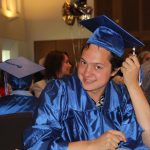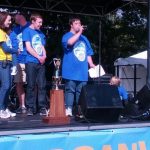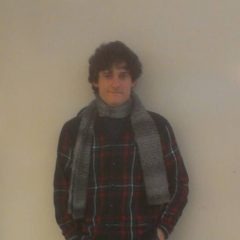Success Stories
Matt's Story
 Self-advocacy is an art that's mastered over periods of time and real-life experiences. Self-advocacy is
all about knowing what you need, and what's actually fair. You can always say you want something, but in
the end, you'll get taken more seriously if you actually know what you're talking about and you know it
might be a deciding factor of you succeeding in something. I'm a senior in high school, and I've always
been told that self-advocacy is a vital part of getting to where you want to be in life. However, to be
honest, I started self-advocating way before anyone told me to do such a thing.
Self-advocacy is an art that's mastered over periods of time and real-life experiences. Self-advocacy is
all about knowing what you need, and what's actually fair. You can always say you want something, but in
the end, you'll get taken more seriously if you actually know what you're talking about and you know it
might be a deciding factor of you succeeding in something. I'm a senior in high school, and I've always
been told that self-advocacy is a vital part of getting to where you want to be in life. However, to be
honest, I started self-advocating way before anyone told me to do such a thing.
It all started in the 6th grade, when I had just entered Rogers Park Middle School. I was always in school with
a paraprofessional tutor at all times, and I'll admit sometimes it was fun to always walk around and be with an
adult, even if you didn't have a lot of friends or people you knew. But as the days went on, I started to notice
that everyone else didn't have this going on, and some people even asked me why he was always following me. I
didn't always know what to say, and sometimes I had to say that he was just here to make sure I was doing what
I was supposed to do.
I always cared about social relations and making friends, and I began to think that my tutor was becoming a
social impediment. Not only that, I wasn't making all my own decisions, most of the time the tutor would tell
me what to do and make my decisions for me. I really did appreciated it when I couldn't make my own decisions,
but I began to realize that if I didn't start thinking and making my own decisions without help from a
paraprofessional, I wouldn't know how to think for myself and stand up for myself outside of school when he
wouldn't be able to be there for me.
What I realized is that I had to stand up for myself and say that I simply didn't need him anymore. I went
to my PPT in June that year and my little self said that I've grown up a lot now since Preschool and I feel
as if I don't need my paraprofessional anymore. I also stated that it was necessary for me to be on my own
more often so I could make my own decisions and stand up for myself. Sure enough, with enough arguments and
reasoning, I got what I needed. Now I feel as if I'm an advocate for self-advocacy. With many friendships
in high school and becoming part of a very competitive track team, self-advocacy certainly has paid off for me.
Heather's Story
 Heather Walton is a bright, beautiful, talented and active member of the freshman class at Southern Connecticut
State University. At age nineteen, she is taking a full courseload, coordinates a number of fund raising activities
through the Disability Resource Center and takes advantage of every opportunity to heighten awareness about the
capacities of people with disabilities. When time permits, she continues to work part-time at the Big Y.
Heather Walton is a bright, beautiful, talented and active member of the freshman class at Southern Connecticut
State University. At age nineteen, she is taking a full courseload, coordinates a number of fund raising activities
through the Disability Resource Center and takes advantage of every opportunity to heighten awareness about the
capacities of people with disabilities. When time permits, she continues to work part-time at the Big Y.
It sounds like life has been perfect for Heather – but the journey has often been a long, exhausting and
challenging one. Heather was born with Albinism. She is legally blind, has a blood clotting disorder and must be
extemely careful when being out in the sun. "Everything just takes so much longer for me to accomplish. It's not
just the academics and needing assistance with note-taking and reading regular textbooks – it's the everyday
things most people take for granted – crossing the street, looking for a building number or just going swimming
in the summer with my friends". Perhaps one of Heather's biggest regrets is that she will never be able to drive.
Despite the challenges Heather has faced, she has a clear sense of who she is and what she wants to be.
When asked to remember how it was growing up with a disability, Heather is quick to remember many experiences in
elementary, middle and high school. One of Heather's earliest memories was during fourth grade when her peers
would taunt her. They frequently called her names ranging from a "red-eyed devil" to a "vampire". Heather went
to her counselor to express her distress, and together they put together a small disability awareness session
about Albinism that Heather presented to her class. A small step that laid the foundation for how Heather would
manage the challenges she would face in middle school and high school.
When asked what her parents did to support her throughout her educational experience and what skills students
need to begin to plan for their eventual transition from high school to college or work, Heather was quick to come
up with a concrete list of suggestions:
- Your parents always need to be your best and strongest "supporters", but they need to understand that eventually you will need to speak and do for yourself.
- Attend your PPT's as early as possible. Heather started to attend her PPT's in the 3rd grade. She readily admits she played a passive role at this age, but she began to learn a lot about herself – her strengths and abilities, as well as the supports and accommodations she needed to be successful and what her school was responsible for.
- As early as possible, take an active vocal role in your PPTs. Heather began to vocalize as early as middle school. She knew exactly what accommodations she needed as well as what she was entitled to under special education law. PPT meetings were not always a smooth and positive experience, but she was confident that her "voice" was beginning to be heard. She was able to clearly articulate her learning strengths and weaknesses – a skill that she has nurtured and embraced since an early age.
- Go into your PPT's with a list of questions. As simple as the questions may be, be prepared to ask for help in any areas you are having difficulties.
- Be assertive, but not aggressive. It comes down to "being nice" and getting teachers and friends to want to help you.
- Accept yourself for who you are – know that you have a lot to give and there are people who are willing to help.
- Be proactive – even at an early age, talk to all of your teachers about how you learn best, and what supports you need to be successful in their class. Don't wait for them to come to you – it may never happen.
- Surround yourself with people who accept you for who you are and create a support network that is available to help you academically and socially. While "fitting in and being popular" is a strong desire for every middle and high school student, having a network of caring, supportive adults and peers will lay a foundation for a greater sense of self worth.
- Become involved – if you can't actively participate in sports (as Heather couldn't), become the team manager and feel a part of something larger than yourself.
As Heather transitioned from middle school to high school, her strong sense of self and self-advocacy became even more important. She took advantage of every opportunity that came her way; attending leadership forums, presenting disability awareness workshops and participating in school and community activities.
Perhaps Heather summarized her life-long challenges with these simple words "Know what you need to succeed" – and don't be afraid to seek anyone or anything to help you reach your goals.
Julian's Story
 There are those special moments in life, particularly when a child has a disability, that are cherished and savored;
when a milestone of accomplishment is reached. On April 28, 2006, one such milestone occurred for a 17-year-old young
man named Julian Tremblay, of Putnam. Seeing Julian through the pre-prom preparations, watching him try on his first
tuxedo, and having all the prom jitters as every other parent of a "typical" teenager does, there are no real words
to appropriately describe how monumental this occasion was; to see Julian succeeding, belonging, and most importantly,
enjoying this special night, along with the rest of his peers.
There are those special moments in life, particularly when a child has a disability, that are cherished and savored;
when a milestone of accomplishment is reached. On April 28, 2006, one such milestone occurred for a 17-year-old young
man named Julian Tremblay, of Putnam. Seeing Julian through the pre-prom preparations, watching him try on his first
tuxedo, and having all the prom jitters as every other parent of a "typical" teenager does, there are no real words
to appropriately describe how monumental this occasion was; to see Julian succeeding, belonging, and most importantly,
enjoying this special night, along with the rest of his peers.
These glorious success stories do not come easily, but they can come, they will come, and they MUST come. With
each parent and professional who advocates, each neighbor, support staff, and classmate, who step forward, not
back: for each teacher who goes the extra mile, each school system that pays more than lip service to promoting
inclusion of all students; events such as this one will not just be "best practice," but the ONLY practice, of
communities across CT.
Andrew R.'s Story
 My name is Andrew, and I am 23 years old. I want to share my success story:
My name is Andrew, and I am 23 years old. I want to share my success story:
When I was in preschool I was diagnosed with Multi System Developmental Disorder. Eventually that was changed to
Neurological Impairment, Pervasive Developmental Disorder with Anxiety and ADHD, and eventually an Autism Spectrum
Disorder.
When I was in 3rd grade I had difficulty with school work and my mom understood that and tried to do everything she
could to help me. Sometimes she didn't know what to do and she didn't know many other people with kids with disabilities
to ask. One day she met a mom at my swimming lessons. That mom told my mom about CPAC and a training program where she
could learn about special education. The next day my mom called CPAC and learned a lot about helping me.
When I was in middle school I had a really hard time. My 8th grade year was the worst. I had a lot of anxiety because
I felt that the teachers were not really helping me very much. I refused to go to my math class a lot, and I didn't do
very well in that class. I was sent to the principal's office for things I didn't even do. I wasn't a bad kid; I was
just having a hard time and being misunderstood. I didn't want to go to school and my mom had to pick me up early a
lot. I just didn't want to be there. My mom had a lot of meetings with the school to try and help me out.
High school definitely went better and was not as bad a middle school. There were still some bumps, and my mom had to
work hard to make sure I was getting what I needed in school. I joined the Best Buddies program and met some people
who became my friends. I am still friends with one of my Best Buddies to this day.
During the spring of my senior year my mom and my teachers began trying to help me figure out my future. They asked
me a lot of questions, but I had no idea what I wanted to do. My mom didn't think going back to the high school after
my senior year was the right thing for me. She advocated for me to attend a transition academy, and I'm so glad she did.
At first it was really hard to go to a new place. I didn't know anyone and it was in a different town. But at the
transition academy I learned how to deal with my anxiety better and how to accept my disability as just a part of
who I am. I also learned work skills, made lots of friends, had awesome teachers and job coaches, and learned how
to take the bus and get around the community. I learned how to run my own PPT meeting and how to be a self-advocate.
We also went on a lot of fun outings in and around the community. I graduated from the transition academy in June 2014.
For the first three months after I graduated I worked at Price Chopper doing bagging and stocking. After that, I
worked with the CT Bureau of Rehabilitation Services and Easter Seals trying to find another job. I went on my
first job interview on my own and was really nervous. Unfortunately, I didn't get that job, but in May, 2015 I did
get a job in a small grocery store where I am still working today. I also began speaking on panels at CPAC presentations.
It feels nice to share my experiences with other students, young adults, and parents. When I'm sharing my story with the
people at the presentations I hope it helps the parents to help their kids just like my mom helped me out. I hope I can
inspire the kids to know that they can get through the hard times.
Zeb's Story
 My Mom would have said that CPAC was her lifeline. I entered kindergarten in 1998 as the first student with a disability
in a regular classroom in my school district. The other special ed students were sent to another school across town.
My Mom wanted me in an inclusive environment. My kindergarten teacher was my Mom's friend so it was ok. The years that
followed were not always good. My Mom went to many CPAC trainings and learned the laws. She called them a lot for
advice. I think she memorized their phone number.
My Mom would have said that CPAC was her lifeline. I entered kindergarten in 1998 as the first student with a disability
in a regular classroom in my school district. The other special ed students were sent to another school across town.
My Mom wanted me in an inclusive environment. My kindergarten teacher was my Mom's friend so it was ok. The years that
followed were not always good. My Mom went to many CPAC trainings and learned the laws. She called them a lot for
advice. I think she memorized their phone number.
CPAC taught her her how important it was for me to be a good self advocate when I was young. I attended PPT meetings
since second grade. It made most of my teachers mad. They didn't want me at those meetings but my Mom told me it was
important for me to be at "my meeting." She taught me that I had the right to make decisions. I wanted to go to college
and I was told at a high school PPT meeting that I could not go because I had a disability. I told my teachers it was
my life and that they could not tell me what to do. I did go to college!
Andrew A.'s Story
"Finding my Voice"
 My story started when I was at Farmington Valley Transition Academy (FVTA) from 2011 to 2014. When I first got there,
I did not think much about myself or my future. Being there for that time helped me shape into my true character. I
learned a lot over there from life skills, taking the public bus, cooking some food, and taking courses at Manchester
Community College (MCC). Things were going well until at my final year, where I realized that I be leaving there
during 2014. I realized that there was still a lot I did not know for life skills and I panicked. Due to this period, I got connected with BRS, did a test, and I got a job for that summer. I eventually got the results of the test and it was not me. I remembered feeling shocked on it, reading the low scores during the testing. During some of the questionnaires done with my Dad, it mentions that I have a monotone voice and that I will attempt to please others if I am paying attention. The last page at the conclusion with the job recommendations. It stated that I would do better in a structured predictable setting with the words "The work should be unskilled."
My story started when I was at Farmington Valley Transition Academy (FVTA) from 2011 to 2014. When I first got there,
I did not think much about myself or my future. Being there for that time helped me shape into my true character. I
learned a lot over there from life skills, taking the public bus, cooking some food, and taking courses at Manchester
Community College (MCC). Things were going well until at my final year, where I realized that I be leaving there
during 2014. I realized that there was still a lot I did not know for life skills and I panicked. Due to this period, I got connected with BRS, did a test, and I got a job for that summer. I eventually got the results of the test and it was not me. I remembered feeling shocked on it, reading the low scores during the testing. During some of the questionnaires done with my Dad, it mentions that I have a monotone voice and that I will attempt to please others if I am paying attention. The last page at the conclusion with the job recommendations. It stated that I would do better in a structured predictable setting with the words "The work should be unskilled."
To say that the results did not have any impact would be an understatement. The big thing I got out of this in my
initial thought was that I am lazy. I remember feeling empty, lost for a while after that experience. I always knew
I have autism, but I never thought of the negative sides of autism until that experience. Looking back into my past
and I had thoughts that I was an unsociable freak that missed opportunities due to my own blindness. It got worse
when I learned more of the facts with adults with autism that there are often not a lot of services out there. Even
for something like the state services, the wait times were not worth it. Another fact is that adults with disabilities
are likely to be in risk of poverty. That fact scared me back then and it still scares me now. Combined with me
avoiding certain hobbies that is common for people with autism to enjoy like Disney movies and for some, Japanese
Animation. I avoided them, so I never have to feel the pain of being negatively labeled again. Lastly, I felt out
of place with the autism community. Unlike most that have an interest in computers and numbers, I do not have an
interest in them. I also have a different view of neurodiversity. I am fine with finding strengths in people, but I
dislike the whole being proud of having a disability angle that people go into. It does not feel right to me. Anyways,
I was a wreck.
I got myself to go back to MCC in 2015 after taking some time away after the summer of 2014 to straighten my act up.
I had to find out who am I in midst of everything, even with the odds against me. There was one thing that really
helped me out during this time is my involvement with a video gaming group on Facebook. It is a group where local
people trade, sell, and buy games with each other. I always into video games, so I went to a couple of events, joined
the group and I did not look back. It really helped me socially because people gave me a chance and I felt opened. I
made some rather close friends from it and still making friends from it. With this going on back in mid-2015, I took
a personal growth course that allowed me to take a look in my life in a new light.
Taking that class made me realized that I was the one holding myself back. I was hiding my own voice. I tried to
soldiered all of my fears, but it was eating me inside. This year is basically myself using that knowledge to improve
my life. For this year, I completed more courses at MCC, I made more friends, and I realize my true passion. It is to
be a disability specialist to help adults with autism. I realized this more and more when I take disability related
courses and spending my time at Autism Services and Resources Center(ASRC). I go there for the social group and for
volunteering as a mentor. Every time I take part of ASRC, I learn something new every day.
Looking back in my search for self-actualization, I realized that these actions I done were by what I learned from
FVTA. I did learn enough life skills that got me to the spot I am at now. My time at FVTA taught me to advocate for
myself. To continually learning and being resourceful with my knowledge. I feel like my voice, views, and willingness
to take initiative are my real strengths. It is the type of strength, that no test can ever measure. My advice to
everyone is to take any opportunities you can. Do not go by a test to fully know a person because you will miss out
on a lot more about a person. The next part is for school professionals, but please let your students learn more about
their disabilities to be self-aware. Don't limit their tasks and give them a voice to speak. Don't ever take their
voice away.
